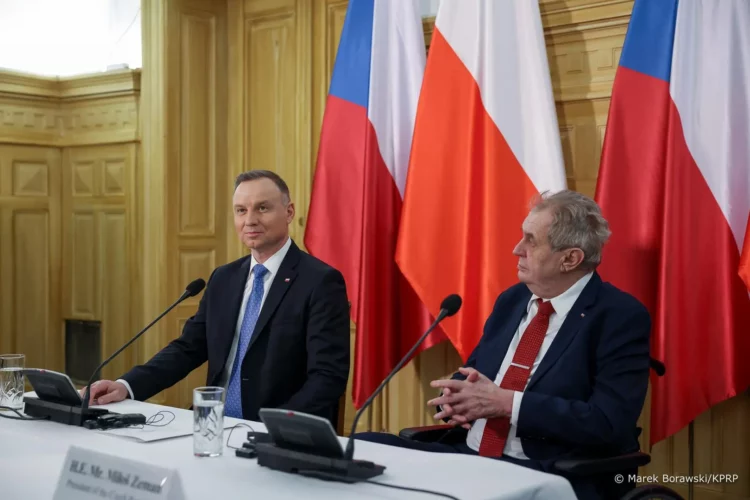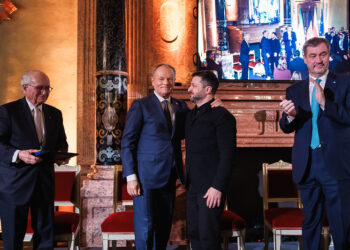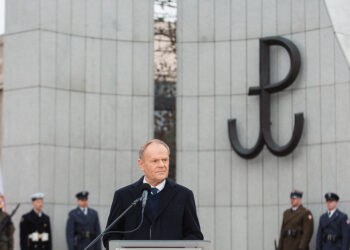Former Czech President Miloš Zeman, known for his controversial tenure from 2013 to 2023, allegedly gifted bottles of unlicensed plum brandy (slivovitz) to visiting foreign dignitaries, including Poland’s President Andrzej Duda, according to a report by Czech media outlet Seznam Zprávy. The revelations have sparked questions about the propriety of such gifts and the handling of state protocols during Zeman’s presidency.
The report, based on police investigation records, suggests that Zeman routinely distributed bottles of slivovitz without excise tax stamps as diplomatic gifts. Among the recipients were Duda, Hungarian President Katalin Novák, Israeli President Isaac Herzog, and even Qatar’s Emir Tamim bin Hamad Al Thani—despite alcohol being prohibited under Islamic law. Duda reportedly received ten bottles during his visits to Prague.
A Questionable Practice
The gifts were part of a broader inquiry into alleged irregularities in the management of the Czech presidential office under Zeman. Investigators examined the origins and costs of these bottles, which were often filled with leftover alcohol from other gifts Zeman received. The liquor was decanted into decorative bottles adorned with Zeman’s autograph. These bottles were reportedly purchased at a cost of 3,000 Czech koruna (approximately $140) each from a company that primarily operated as an auto repair shop and lacked proper licensing for alcohol distribution.
Despite the irregularities, Czech authorities concluded there was no criminal wrongdoing in this practice or in the procurement process. However, the current administration under President Petr Pavel has not ruled out filing a formal complaint regarding potential violations.
Diplomatic Fallout
The revelations come at a time when Duda’s association with Zeman has already drawn scrutiny. In September 2024, Duda faced criticism for attending Zeman’s lavish 80th birthday party alongside other leaders like Hungarian Prime Minister Viktor Orbán and Serbian President Aleksandar Vučić. Critics argued that such appearances undermined Duda’s credibility as a staunch advocate for Ukraine amid its ongoing conflict with Russia, given Zeman’s history of pro-Russian stances.
Polish Foreign Minister Radosław Sikorski publicly rebuked Duda for his choice of associations, suggesting it sent mixed signals about Poland’s foreign policy priorities. “I would suggest Mr. President choose his friends more carefully,” Sikorski said at the time.
Zeman’s Controversial Legacy
Zeman, a polarizing figure in Czech politics, has long been criticized for his close ties to Russia and China. During his presidency, he advocated for Russian participation in sensitive projects like the Dukovany Nuclear Power Station expansion and dismissed allegations of Russian involvement in incidents such as the 2014 Vrbětice ammunition depot explosions. However, his stance shifted following Russia’s invasion of Ukraine in 2022, when he condemned Vladimir Putin and called for sanctions against Moscow.
The gifting of unlicensed slivovitz adds another layer to Zeman’s contentious legacy. While slivovitz is a cultural staple in Central Europe and often exchanged as a gesture of goodwill, its use in this context raises questions about adherence to diplomatic norms and legal standards.
Broader Implications
For Duda, the incident highlights the complexities of international diplomacy and the potential pitfalls of engaging with controversial figures. While there is no suggestion that Duda or other recipients were aware of the questionable nature of the gifts, the episode underscores the importance of transparency and accountability in state-level exchanges.
As these revelations continue to unfold, they serve as a reminder of the delicate balance between tradition and legality in diplomatic practices—and the reputational risks that can arise when that balance is disrupted.


















